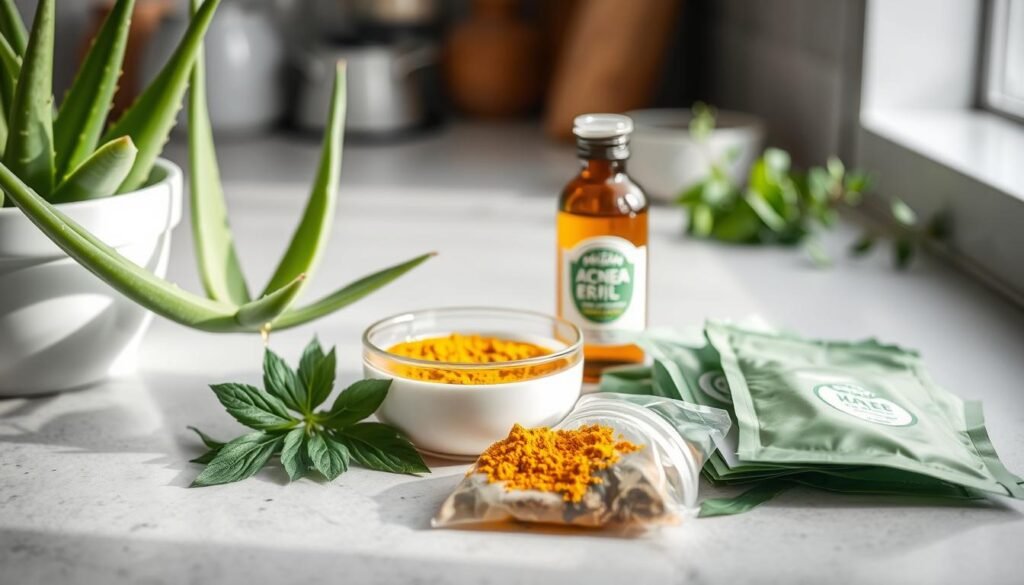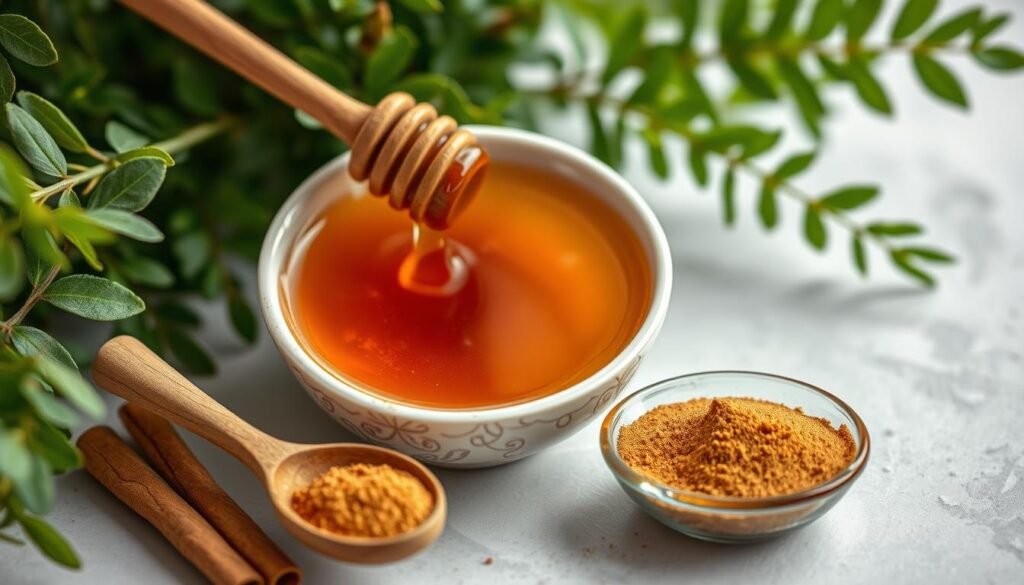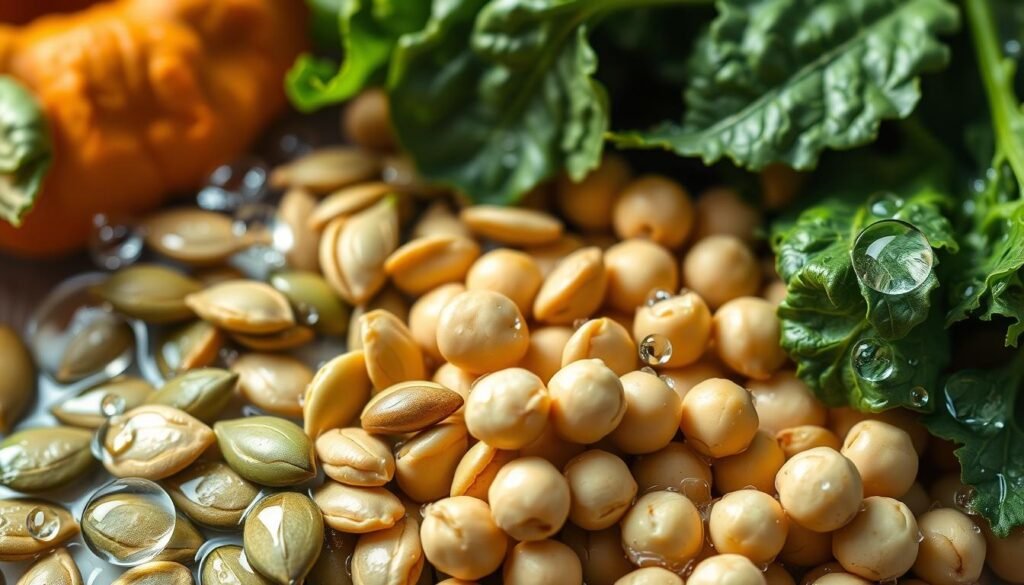Acne affects about 85 percent of young adults around the world. Many people use treatments like salicylic acid, which can cause dryness. To avoid these side effects, 77 percent of people with acne are trying natural remedies. This article will talk about five effective home treatments for acne, supported by both research and personal stories.
Key Takeaways
- Acne impacts 85% of young adults globally.
- 77% of individuals with acne seek alternative treatments.
- Natural remedies may reduce irritation compared to conventional methods.
- Apple cider vinegar and tea tree oil are popular natural treatments.
- Research supports the benefits of zinc in improving acne.
Understanding Acne: What You Need to Know
Acne is a common skin issue that shows up in different ways, like whiteheads, blackheads, and pimples. It happens when oil and dead skin clog up our skin pores. This mostly starts in the teen years because of more oil in the skin but can continue into adult life.
Acne can appear in many forms:
- Whiteheads
- Blackheads
- Papules
- Pustules
- Nodules
- Cysts
Genes and hormones greatly affect acne, as well as what we eat. Foods high in sugars and dairy might make acne worse. Knowing all about acne is key to handling it.
To fight acne, it helps to use tried-and-true treatments like benzoyl peroxide and salicylic acid. These need to be used regularly to work. By understanding acne better, we can make smarter choices for our skin.
| Treatment Method | Effectiveness Duration | Common Side Effects |
|---|---|---|
| Benzoyl Peroxide | 4 weeks | Skin dryness, irritation |
| Salicylic Acid | Ongoing | Minor irritation |
| Topical Retinoids | 8-12 weeks | Initially worsens acne, dryness |
| Oral Antibiotics | Weeks to months | Nausea, potential resistance |
| Isotretinoin | Variable | Birth defects, severe side effects |
| Oral Contraceptives | Variable | Nausea, blood clots |
What Causes Acne?
To understand acne, we look at several factors. Hormones play a key role, especially in teens and pregnant women. These hormonal changes can increase oil output, leading to clogged pores. This environment is perfect for Propionibacterium acnes bacteria, causing inflammation.
Dead skin cells also clog pores and help bacteria grow. Stress, what we eat, and our genes can trigger acne too. If your family has a history of acne, you might notice it more. And if you have darker skin, you may deal with scars and color changes more often.
External factors and lifestyle choices affect acne too. Greasy surfaces and tight clothes can make it worse. While we often think of acne in young people, it can happen at any age. Not treating severe acne can leave scars. This can impact how we look and feel about ourselves.
| Factor | Description |
|---|---|
| Hormonal Changes | Often occur during puberty, menstruation, or pregnancy. |
| Genetics | Family history increases the likelihood of developing acne. |
| Age | Most prevalent in teenagers, but can persist into adulthood. |
| Skin Type | Individuals with darker skin may experience higher complication rates. |
| External Triggers | Stress, diet, and certain medications can exacerbate conditions. |
| Acne Severity | Severity can range from mild to severe, potentially leading to scarring. |
Why Consider Natural Home Remedies?
Acne is common, with 85% of people getting it in their late teens to mid-20s. Even adults struggle with it, with 12% of women and 3% of men affected. This makes finding effective solutions important. Home remedies are great because they’re affordable and easy to find.
Home remedies have fewer side effects than store-bought treatments. They’re softer on the skin, which is good for those with sensitivity. Traditional acne creams might cause dryness or irritation, pushing people to give up on them.
Herbal remedies have been fighting acne for centuries. Ingredients like neem and tea tree oil have antibacterial properties. A study in 1990 showed that tea tree oil gel can reduce acne just as well as benzoyl peroxide.
People can make acne treatments at home that suit their skin type. Making skincare products can be fun and empowering. While results vary, these homemade solutions are a favorite for those wanting control over their skincare.
5 Powerful Home Remedies for Acne
Acne is a big issue for many, especially young adults. Looking into homemade acne remedies helps find good solutions. These methods share top ingredients and their special perks for organic acne control.
Apple Cider Vinegar: A Potent Option
Apple cider vinegar is known for fighting bacteria. It might kill acne-causing bacteria effectively. When using it, mix one part vinegar with three parts water.
Putting this blend on your skin could make scars look better. It might also lower the number of breakouts.
Benefits and Risks of Using Apple Cider Vinegar
Apple cider vinegar benefits go beyond treating acne. It can help make the skin clearer overall. But, using it too strong might irritate the skin.
Too much acid can disturb your skin’s balance. This could cause more issues if not used right.

Trying effective home remedies can help you handle acne better. Besides apple cider vinegar, honey, yogurt, and cucumber are good too. Each has special properties for tackling acne.
Interested in learning more about acne? Visit this resource for in-depth info.
Spot Treating with Tea Tree Oil
Tea tree oil is known for its natural power against acne, thanks to its strong antibacterial effects. It comes from the Melaleuca alternifolia plant’s leaves, boasting anti-inflammatory and antimicrobial properties. People with acne choose tea tree oil for its healing effects and its lower risk of irritation, unlike benzoyl peroxide.
Tea Tree Oil: Antibacterial Properties
Tea tree oil’s antibacterial qualities make it a strong choice against P. acnes, the main acne-causing bacteria. Research shows it can lower acne spots and lessen breakouts’ severity. Using tea tree oil gently twice a day can ease mild acne. This is especially true when used with aloe vera. The key ingredient, terpinene-4-ol, attacks bacterial cells, stopping acne.
How to Use Tea Tree Oil Effectively
For effective acne treatment, it’s important to apply tea tree oil correctly. Mix 1 part oil with 9 parts water for a safe solution. Apply this mix directly to blemishes as a spot treatment. Always do a patch test on your elbow to avoid facial skin reactions.
Adding tea tree oil to skincare like cleansers and oils can boost its benefits. Using it for twelve weeks has helped many, making it a popular natural acne solution. Further research into tea tree oil’s antibacterial action shows its value in acne care routines.
| Property | Details |
|---|---|
| Type | Essential Oil |
| Main Active Ingredient | Terpinene-4-ol |
| Recommended Dilution | 1 part tea tree oil to 9 parts water |
| Application Frequency | Twice daily |
| Patch Test | Yes, on the inside of the elbow |
| Benefits | Reduces acne lesions, minimizes irritation |
| Usage Form | Spot treatment, cleansers, oils |
For more about how to use tea tree oil, check out various studies. You can find reliable information about the uses of tea tree oil for acne.
Creating a Honey and Cinnamon Mask
The honey cinnamon mask treats acne with antibacterial properties of honey and cinnamon. They team up in a homemade mask that boosts honey and cinnamon benefits for skin. This natural treatment fights bacteria and soothes inflammation.
Antibacterial Effects of Honey and Cinnamon
Honey, especially Manuka honey, is packed with antibacterial qualities. It helps unclog pores and lessen acne. Cinnamon brings its antimicrobial and anti-inflammatory powers to the mix. This combo fights skin blemishes and aids in healing.
A Simple DIY Recipe for the Mask
For this DIY acne mask, just follow these steps:
- 2 tablespoons of honey (preferably Manuka)
- 1 teaspoon of ground cinnamon
Stir them into a smooth paste. Apply it to your skin and wait for 10-15 minutes before washing off. Try a patch test first to avoid allergic reactions. This mask works well with other treatments like tea tree oil or green tea.

| Ingredient | Benefit |
|---|---|
| Honey | Antibacterial, anti-inflammatory, moisturizing properties |
| Cinnamon | Antimicrobial, may reduce signs of aging, soothing effects |
Applying Green Tea for Clearer Skin
Using green tea for acne care has become quite popular, thanks to its green tea benefits for skin. Its powerful ingredients help soothe irritation and support skin health. Studies show the antioxidants in green tea, like epigallocatechin gallate (EGCG), reduce inflammation. By adding this natural remedy to your skincare, fighting acne with green tea becomes easy.
Antioxidant Properties of Green Tea
Green tea is full of antioxidants that tackle pollutants, which can cause acne. Its polyphenols help lessen inflammation and kill acne-causing bacteria. Being regularly exposed to green tea skin benefits can lead to a clearer skin by reducing sebum, which prevents pores from clogging.
How to Prepare and Use Green Tea on Skin
To prepare green tea for skin, start by brewing the leaves correctly. Here are simple steps for an effective green tea skin treatment:
- Brew green tea in boiling water for 3-5 minutes.
- Let it cool to a safe temperature.
- Apply the cooled tea with a cotton ball or spray bottle to the skin.
- Keep it on for 15-20 minutes, then rinse with warm water.
Use this method often in your skincare routine for the best outcomes. Staying consistent with green tea treatments helps manage acne better over time.
| Property | Benefits |
|---|---|
| Antioxidants in Green Tea | Reduces inflammation and fights bacteria that cause acne. |
| Antimicrobial Effects | Stops acne-causing bacteria, leading to clearer skin. |
| Skin Regulating | Keeps sebum levels in check to avoid pore blockage. |
| Vitamin Rich | Loaded with Vitamin C and E for better skin health. |
| Accessibility | Available in a variety of products like lotions and masks. |
Adding green tea skincare products to your daily routine brings numerous benefits. Following these steps can improve your skin’s look and health significantly.
The Role of Zinc in Acne Treatment
Zinc is key in the fight against acne. It reduces inflammation and fights bacteria. Zinc not only lessens acne but also boosts skin health. People with acne and low zinc levels may see improvements by taking zinc supplements. These supplements help heal the skin faster.
How Zinc Supplements Support Skin Health
Zinc plays a crucial role in treating skin. Studies show zinc sulphate is especially good for acne. Taking zinc regularly can reduce inflammation. You might start seeing results in six to eight weeks, reaching full effect by ten to twelve weeks.
For adults with hormonal acne, mixing zinc with certain antibiotics may work better. Experts suggest starting with 80 mg of zinc. But, too much can upset your stomach, so keep an eye on it.
Dosage Recommendations for Zinc
Knowing the right zinc dose is important. Adults usually need 10 to 15 mg daily. But for acne, 80 to 140 mg might be needed. Always check with a doctor to find the best dose for you. Everyone’s needs are different.
| Zinc Dosage for Acne | Daily Recommended Intake | Optimal Treatment Dose | Suggested Supplement Type |
|---|---|---|---|
| Normal Functioning | 10-15 mg | 80-140 mg | Zinc Sulphate |
| Acne Severity Improvement | Consult a professional | 80 mg (starting dose) | Oral Supplement |
| Timing for Benefits | 6-8 weeks for noticeable improvement | 10-12 weeks for maximal effect | Combination with Antibacterials |

Using Witch Hazel: Natural Astringent
Witch hazel is a great choice if you’re looking for witch hazel acne treatment. It’s known for its natural astringent properties. These properties help tighten the skin. This reduces acne-related redness and swelling. Besides tightening skin, witch hazel aids in healing. It also lessens inflammation.
Benefits of Witch Hazel for Acne
Witch hazel assists in many ways. It calms skin irritation and inflammation. This is good news for the 45% of Americans with sensitive skin. Studies prove its value, like one showing a lotion with 10% witch hazel extract helps reduce skin inflammation. Witch hazel also shrinks pores. It stops too much oil production. This keeps breakouts away.
How to Prepare and Apply Witch Hazel
Making witch hazel at home is easy. Just boil its bark in water. After cooling, apply it with a cotton ball. While many products have witch hazel, watch out for unwanted extras in the ingredients. Use it as a toner, spot treatment, or blend it with other natural products. Adding witch hazel to your skincare routine boosts other treatments. It provides a gentler way to handle acne.
Conclusion
Achieving clearer skin can mean looking into many options. This includes natural remedies and regular treatments. Tea tree oil, green tea, and apple cider vinegar are natural solutions. They offer effective and budget-friendly ways to fight acne.
By changing their lifestyle and watching how their skin reacts, people can find what’s best for them. Natural home remedies offer the chance to test and learn. Yet, the success of these methods can vary among individuals. Many have seen their skin health get better.
For those exploring natural methods, products like Exposed Skin Care might be helpful. This combines nature’s best with proven formulas for different skin types. Acne impacts millions in the U.S. Knowing your options can help you in your quest for clear skin.
A review of acne treatments shows that natural remedies can work well with professional advice. This approach can lead to fewer breakouts and better skin health. It’s all about finding the right balance for your skin’s needs.